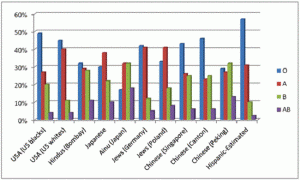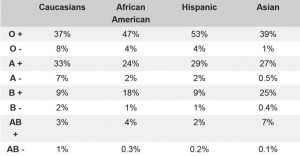
What is the Most Common Blood Type Have you ever wondered why people around the world have different blood type one from another? In fact, even family members can have different blood types. You should be lucky if yours is the most common blood type, which is the type “O”. Having a common blood type … Continue reading “10 Factors Behind The Most Common Blood Type”

What is the Rarest Blood Type The rarest blood type is actually Rh-null, which is the lack of antigens in the Rh system. Less than 1 in 1,000 people have this blood type. However, individuals of this type can donate blood to just about every blood type. Before we proceed to understanding more about Rh-null being … Continue reading “10 Factors Behind the Rarest Blood Type”

The Rhesus factor, specifically rhesus negative, has been a topic of interest for discussions in medical science for a long time. Below are some of the interesting facts you may want to know about Rh negative blood type. Rh Negative Blood Type 1. The Rh negative blood type is not a ‘mutation’. Rhesus factor, referred to as the Rh … Continue reading “10 Rh Negative Blood Type Facts”

AB Negative Blood Type Facts (AB+) 1. The Rarest Blood Type and Universal Plasma Donor The nature of antigens present in the serum determines the blood type. AB negative suggests that an individual has both the antigens A and B. Individuals who are AB blood group are commonly called universal plasma donors because their plasma … Continue reading “10 AB Negative Blood Type Facts”

AB Positive Blood Type Facts (AB+) 1. Universal Plasma Donor and Universal Red Cell Recipient The nature of antigens present in the serum determines the blood type. AB positive suggests that an individual has both the antigens A and B. Individuals who are AB blood group are commonly called universal plasma donors because their plasma can be … Continue reading “10 AB Positive Blood Type Facts”

B Negative Blood Type 1. The Second Rarest Blood Type Negative blood types are actually rarer compared to positive types. The B Negative blood type is one of the rarest and second to AB Negative, being the rarest of the blood types. Being rare, it is extremely important to maintain sufficient supply for this blood … Continue reading “10 B Negative Blood Type Facts”

B Positive Blood Type (B+) 1. The Third Most Common Blood Type The B Positive blood type is extremely valuable where matching supply for the demand has been a constant challenge. However, it is the third most common blood type which is present in about 1 out of 12 individuals. This means an approximately 8.5% … Continue reading “10 B Positive Blood Type Facts”








